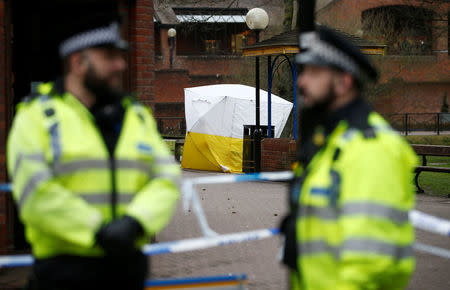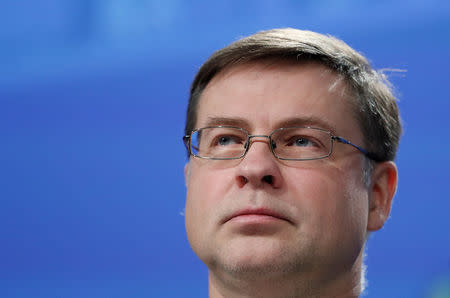Despite Brexit, Britain wins EU support on nerve agent attack
By Robin Emmott and John Irish BRUSSELS/PARIS (Reuters) - Germany and France expressed solidarity with Britain on Tuesday after London accused Moscow of a nerve agent attack on British soil, but beyond strong vocal EU support, diplomats said there was little appetite for more economic sanctions on Russia. Despite tensions over Britain's decision to quit the bloc next year, EU leaders, top officials and NATO reacted in quick succession after British Prime Minister Theresa May's speech in the British parliament on Monday on the poisoning of a former Russian double agent, Sergei Skripal, and his daughter. German Chancellor Angela Merkel spoke to May on Tuesday, a day after French President Emmanuel Macron, and both leaders condemned the attack in statements on Tuesday. "(Merkel) said it's up to Russia to quickly provide answers to the British government's justified questions and to heed the call to completely and immediately lay bare the relevant chemical weapons programme to the Organisation for the Prohibition of Chemical Weapons," said Merkel's spokesman Steffen Seibert, referring to the watchdog in The Hague. The case poses a test for post-Brexit security cooperation as Russia, the EU's biggest energy supplier, grows more assertive abroad, accused of backing war in Ukraine and meddling in U.S., French and German elections. Condemnation from Paris and Berlin followed a day of statements of support from EU officials. The office of EU foreign policy chief Federica Mogherini called use of the Soviet-era nerve agent "shocking" and said the European Union was "ready to offer support if requested". NATO Secretary-General Jens Stoltenberg said it was "horrendous". European Commission deputy head Frans Timmermans called on the bloc to express "its full solidarity with the British people and the British government" and make a collective European effort to find and punish those responsible. But EU governments are divided on how to proceed. While Merkel assured May that she was taking the British government's views on possible Russian involvement extremely seriously, Macron declined to mention Russia on Tuesday. Macron has sought to build a new relationship with Russian President Vladimir Putin and says he does not believe in megaphone diplomacy, although after almost a year in power there is nothing tangible to show that the policy has worked. SANCTIONS RESPONSE? Britain has given Putin until midnight on Tuesday to explain how the nerve agent was used to strike down Skripal, who had passed secrets to British intelligence. If that deadline passes, Britain could ask EU governments to consider new asset freezes and travel bans on Russian officials not already under sanctions related to Moscow's 2014 seizure of Ukraine's Crimea. Britain could also call a special meeting at NATO. Next Monday at a monthly meeting in Brussels, EU foreign ministers are due to discuss Russia's presidential election on March 18, which Putin is expected to win easily, potentially giving Britain's Foreign Secretary Boris Johnson a chance to appeal to EU governments. May herself could directly discuss the issues with fellow leaders in Brussels at a two-day summit in May, and Timmermans said the issue should be on the agenda. "We cannot have nerve gas being used in our societies. This should be addressed by all of us, and not just left to Prime Minister May and the British government," Timmermans, who as Dutch foreign minister in 2014 accused Russia of downing an airliner flying from Amsterdam over Ukraine, told the European Parliament in Strasbourg. Four senior EU diplomats told Reuters that Brussels would wait until Britain itself has taken a view on how to respond before making any policy moves of its own. They dismissed any suggestion that Brexit weakened London's position. "Brexit shouldn't have any effect on this," one said. But diplomats also said additional sanctions on Russia were unlikely to win support because attributing the nerve attack to Moscow was difficult and also because keeping existing economic sanctions on Russia was already difficult. "Despite the seriousness of this incident, I just don't see agreement (on new sanctions)," a second EU diplomat said, predicting a strong statement of support instead. A third diplomat said that Britain and France had been unable to persuade the rest of the bloc to impose additional sanctions on Russians over Moscow's bombing campaign in Syria. Countries seeking closer ties with Russia, notably Italy, Hungary and Greece, are wary of further damaging business. (Additional reporting by Alastair Macdonald and Philip Blenkinsop in Brussels, Andreas Rinke and Andrea Shalal in Berlin; Editing by Angus MacSwan and Gareth Jones)


